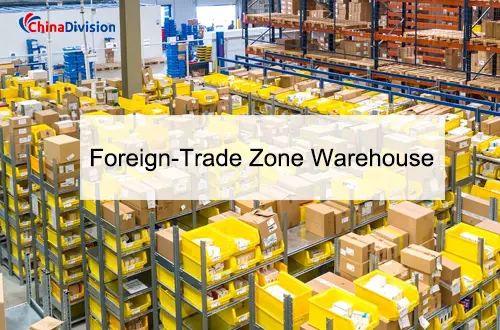Comparing FTZ Warehouses With Other Warehousing Services
How to reduce logistics costs while improving operational efficiency and ensuring regulatory compliance has become a key focus for many B2B companies and e-commerce sellers. You may have heard of terms like "bonded warehousing" and "free trade zones." But what exactly are they? And how can they benefit your business?
Table of Contents
This blog post will provide a comprehensive guide to FTZ warehouses, answering common questions from the perspective of third-party logistics (3PL) and warehousing service providers, and explaining how they can be a key tool for optimizing your supply chain.
What is an FTZ warehouse?
A FTZ warehouse (Foreign-Trade Zone Warehouse) is a bonded storage facility located within a special customs supervision zone that allows businesses to store, process, and repackage imported goods without immediately paying customs duties and VAT. It combines the advantages of bonded warehousing with free trade policies, allowing businesses to complete the storage, processing, sorting, and repackaging of goods without paying customs duties or VAT, until the goods enter the domestic market or are exported to other countries.

Key Features of FTZ Warehouse:
Tariff Exemption and Deferral: Goods can be stored indefinitely within the FTZ, with customs duties only payable upon entry into the domestic market.
Flexible Operations: Supports value-added services such as batch declaration, transit trade, and simple processing.
Policy Benefits: Enjoy exclusive FTZ policies, including simplified customs clearance procedures and relaxed foreign exchange controls.
What are the Types of Free Trade Zones?
General-Purpose FTZs
Open to all industries, they provide basic warehousing, logistics, and trade services.
Suitable for diversified businesses requiring flexible storage and distribution.
Special-Purpose Free Trade Zones (FTZs)
Also known as sub-zones, these zones are established to meet the specific needs of individual companies. They are designed for specific industries (such as electronics, pharmaceuticals, and automotive) and feature specialized facilities and regulatory procedures.
How should companies choose?
Based on matching cargo type with business needs: General-purpose FTZs are suitable for multi-category trade, while specialized FTZs cater to high-value-added or specially regulated goods.
FTZ Warehouse Operations: A Complete Analysis from Entry to Exit
Goods Entry
Companies declare goods entering the zone with customs, eliminating the need to pay customs duties immediately. Goods can be sourced domestically or internationally, and various modes of transportation (sea, air, and land) are supported.
In-Zone Operations
Storage: Indefinite storage, minimizing the risk of exchange rate fluctuations and tariff costs.
Processing: Value-added services such as labeling, subpackaging, and assembly are performed to enhance product value.
Distribution: Goods are distributed in batches to different markets based on order requirements.
Goods Leaving the Zone
Entering the domestic market: Pay customs duties based on the actual quantity leaving the zone.
Exporting to other countries: Enjoy export tax rebates and avoid paying domestic customs duties.
Free Trade Zone vs. Bonded Warehouse vs. Standard Third-Party Logistics Warehousing
The core advantages of free trade zone warehouses lie in deferred customs payment and operational flexibility—there's no need to pay taxes immediately upon goods entering the zone, and they support value-added services such as processing, distribution, and re-export. Goods can be stored in FTZ warehouses indefinitely, without time restrictions. Businesses can flexibly arrange the timing and quantity of goods leaving the zone based on market demand, making them particularly suitable for cross-border trade and supply chain optimization. The main advantages of free trade zones are promoting international trade, reducing business costs, improving logistics efficiency, and attracting foreign investment and industrial clusters.
While bonded warehouses also offer the convenience of deferred customs payment, their scope of operation is limited, typically allowing only storage and simple sorting. The purpose of goods must be registered with customs in advance. These warehouses are more suitable for specific needs such as temporary storage and bonded display of imported goods. Bonded warehouses are ideal for international trading companies that need to defer customs payments, perform simple processing, or await final shipment decisions, effectively alleviating financial pressure and improving supply chain flexibility.
Standard third-party logistics (3PL) warehousing refers to general warehousing and distribution services provided by professional logistics companies, without duty-free or bonded features. This type of warehousing primarily serves the storage, sorting, packaging, and distribution of domestic or duty-paid goods, making it suitable for businesses requiring efficient warehousing management, such as e-commerce, retail, and manufacturing. The advantages of standard third-party logistics warehousing lie in professional operations, manageable costs, and flexible warehousing solutions, but they do not offer preferential tariff policies.
In summary, free trade zones (FTZs) focus on promoting international trade and investment, while bonded warehouses are primarily used for tariff deferral and temporary storage of uncleared goods. Standard third-party logistics warehousing, on the other hand, focuses on the storage and distribution of general goods. Businesses can choose the appropriate warehousing model based on their business needs.
FAQs about FTZ Warehouses
How long can goods be stored in an FTZ warehouse?
Theoretically, indefinitely, but regular inventory status declarations must be submitted to customs. The actual storage period depends on the company's cash flow and market strategy—for example, waiting for a favorable exchange rate to exit the zone, or selling in batches to smooth out tariff expenses.
Which businesses are suitable for FTZ warehouses?
B2B manufacturers: Use FTZs to store raw materials at low cost and process them on demand.
Cross-border e-commerce sellers: Leverage FTZ distribution capabilities to quickly respond to global orders.
Entrepot traders: Complete cargo transfers within FTZs to avoid the high tariffs of direct imports.
Chinadivision: Your Third-Party Logistics Partner
As a professional third-party logistics and warehousing service provider, Chinadivision offers one-stop FTZ solutions to help businesses efficiently manage their global supply chains. By partnering with Chinadivision, you gain more than just a warehouse; you gain a strategic logistics partner dedicated to optimizing your supply chain and maximizing your profits.
Whether you're an e-commerce seller looking to expand internationally or a B2B business seeking to upgrade its supply chain, Chinadivision's FTZ warehousing services provide you with flexible, efficient, and cost-effective solutions.





